The University of Florida (UF) became an ORCID member organization in 2017 initially through the Greater Western Library Alliance (GWLA) consortium, prior to joining the ORCID US Community consortium in 2018. This blog post is based on a presentation by Stephanie Gray, Assistant Vice President & Director of Sponsored Programs, and Karen Pastos, Project Manager, for the ORCID US Community Webinar: ORCID & NSPM-33 (National Security Presidential Memo 33) on July 21, 2022. Many thanks to Stephanie and Karen for sharing their experience, as well as Jordan Edwards, Database Administrator, for developing the custom ORCID API integration described below.
The University of Florida is a large public land grant university in Gainesville, Florida comprised of 16 colleges, with 5,818 faculty, 9,682 staff, 53,372 students, and ~3,000 key personnel on federal awards/proposals receiving $1.076 billion in research expenditures fiscal year 2022. So, when NSPM-33 made it clear that federal funding agencies would soon be using ORCID to identify researchers and enable more efficient disclosures (either optionally or required), staff in the research office (UF Research) began to take note, looking at how the University could prepare for changes to sponsor requirements and reduce administrative burden for faculty seeking federal funding.
Writing Funding Information to ORCID Records
In spring of 2022, UF Research staff embarked on a project to assist UF researchers with populating their ORCID records and curating their other support funding data. They created a centralized web-based portal for researchers to send curated information (such as funding awards received) to their ORCID records. The portal was ready within a few months, and by July of 2022, over 3,000 UF researchers have connected their ORCID iD to the University of Florida’s ORCID API integration. Researchers who have used the UF ORCID Portal can go on to use data from their ORCID record to populate their biographical sketches for NIH and NSF grant proposals, using SciENcv. In terms of the type of information that UF is adding to researchers’ ORCID records, funding information took priority because the UF Sponsored Programs office has a detailed and curated record of funding received from over 1,700 different sponsors. (UF is also interested in writing employment and works information to ORCID records, but that data has proven to be harder to identify, curate, and manage.)
UF researchers can now have their funding written to their ORCID record for them by using the UF ORCID integration. To do so, they first go to https://research.ufl.edu/orcid.html, and click on the orange button to “Create/Connect ORCID iD”:
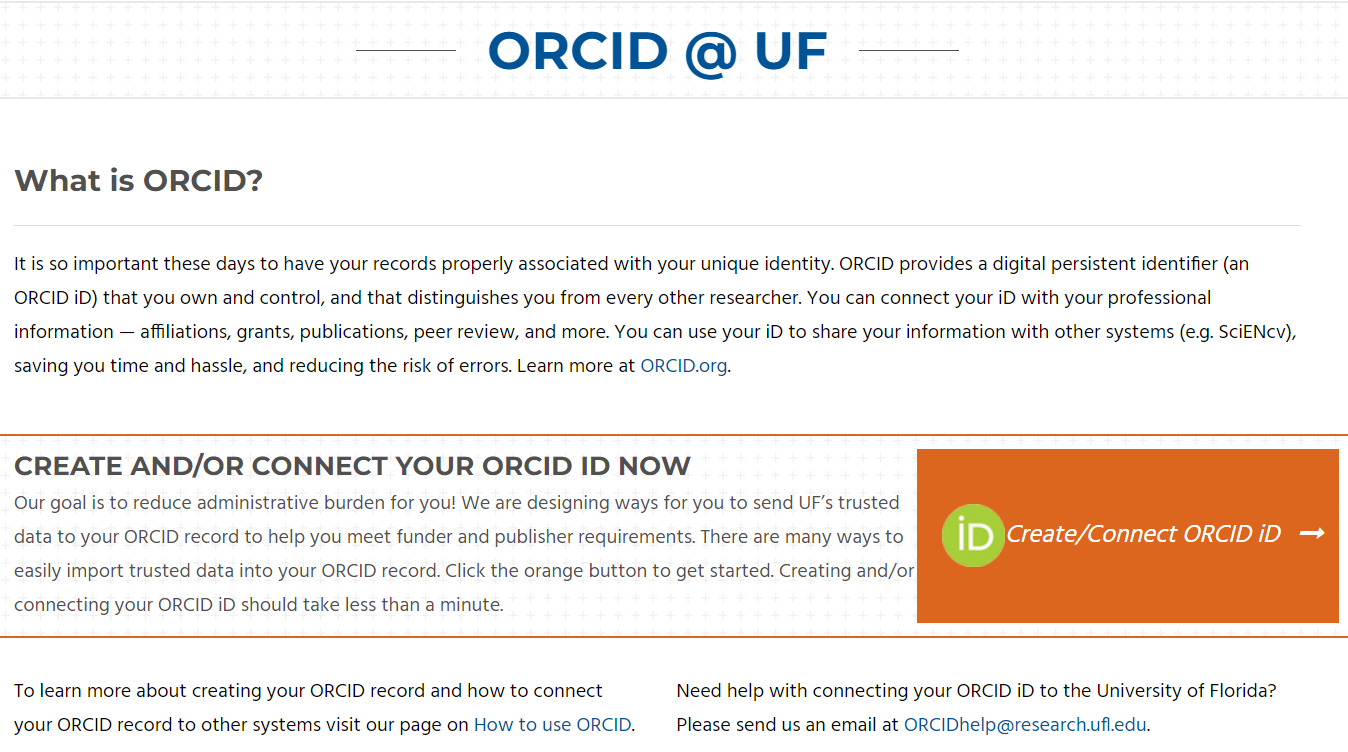
Upon clicking that button, users are prompted to sign in with their UF credentials, and then to sign in to their ORCID account:

Users are then asked to authorize University of Florida as a trusted party on their ORCID record, as part of the ORCID API OAuth process:
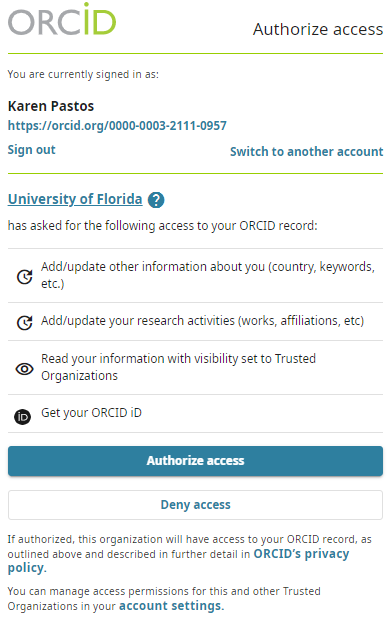
Once users have connected their ORCID iD to UF, they can access the UF ORCID Portal, which currently contains two tables: “Awards” and “Pending Proposals.” The data in each table comes directly from the UF Grants Management system (using Huron software). Changes to proposals and awards are reflected in real time, so the portal will always display the most recent status updates.



A closer look at the portal’s award table shows how the user can send a funding entry to their ORCID record. If an award entry has never been sent to ORCID from the portal, the user will see the “Send to ORCID” button:

If an award entry has been sent to ORCID previously, the user will see the “Update ORCID” button and also the date/time stamp of when the entry was last sent to ORCID:

Users might want to resend an award entry to their ORCID record if they accidentally deleted it in their ORCID record, or if there was an update to the award data – like a change to the end date or a change to the total award amount.
The selected funding entries are written to the user’s ORCID record via API, appearing in the ORCID record with the source of the data as “University of Florida.” In the screenshot below, the data highlighted in yellow came from UF’s grant management system. Note that the entry contains the ROR (Research Organization Registry) ID for the sponsor:
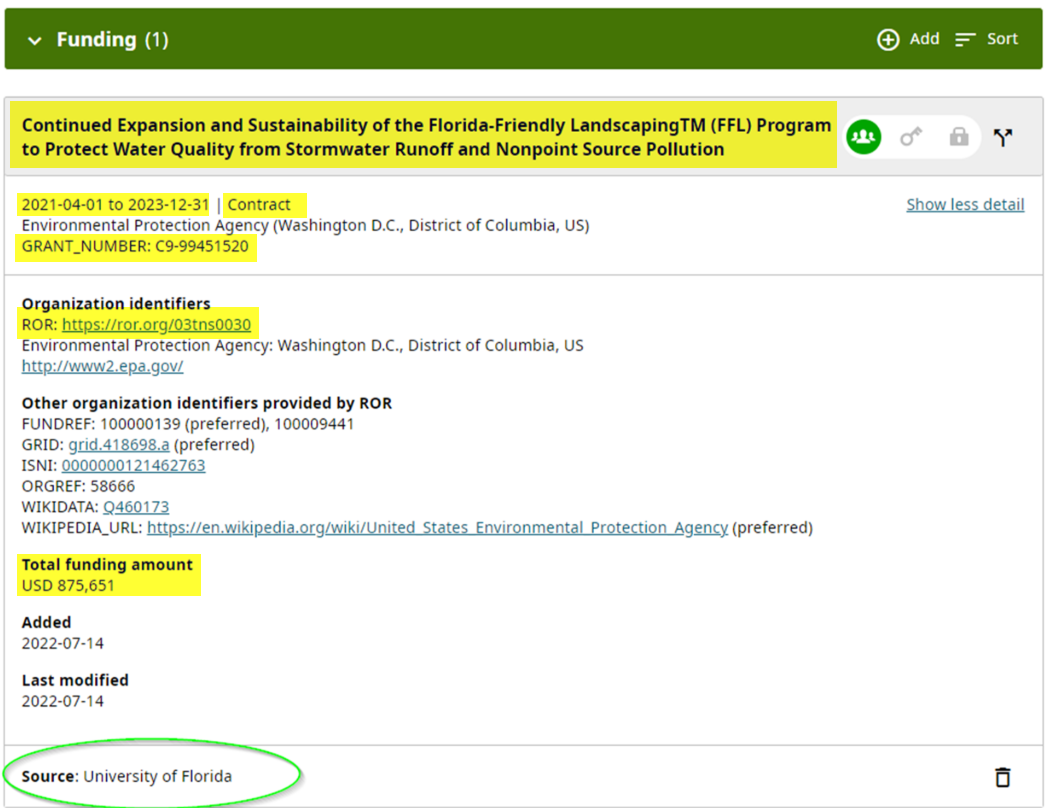
In case a funding entry was written to a user’s ORCID record by different sources, such as Dimensions Wizard and the University of Florida, the duplicate entries would be grouped together based on having matching grant numbers or grant identifiers, and the user can then select which entry they want to appear on top as the preferred source:
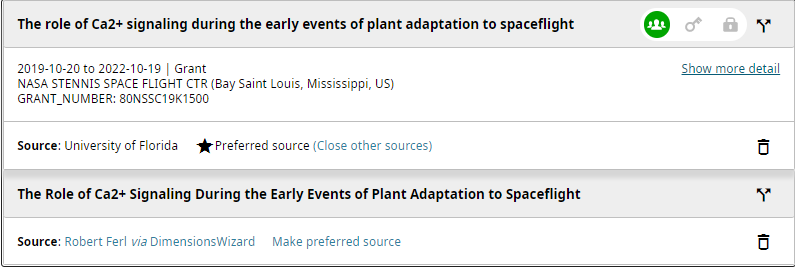
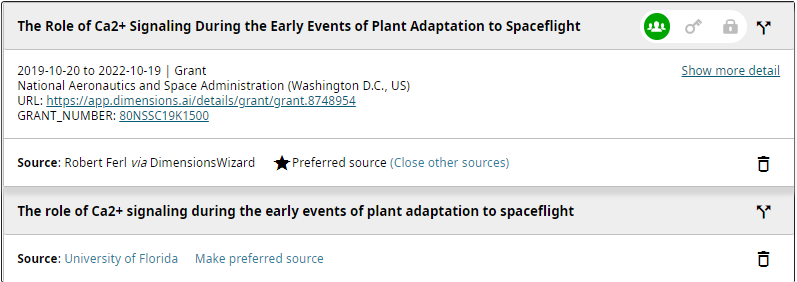
The UF ORCID Portal also includes sections on “effort commitment” and “pending proposals.” These categories are not part of ORCID, so users can not send these data points to ORCID, but UF makes the information available in the Portal because many funders ask for this information on “current and pending” support forms as part of the proposal and award processes.
Outreach & Adoption
Since the UF ORCID Portal was designed to help UF researchers populate their ORCID records, it was important to also include outreach and education to make UF researchers aware of how they can use the Portal. To promote ORCID and the UF ORCID Portal, the UF Research team:
- Facilitated email campaigns through college research deans and graduate school dean
- Set up ORCID info tables at Research Poster Sessions
- Communicated about ORCID with college/department editors
- Announced the launch of the UF ORCID Portal from the Vice President for Research
- Sent targeted emails from UF Research to key stakeholders
The UF ORCID Portal was officially announced in May 2022, and by July they already had 3,000 individuals connect their ORCID iD to the Portal. The UF Research team found that most of their researchers already had an ORCID iD prior to connecting with the Portal, and the targeted emails from UF Research were the most effective in getting researchers to connect their ORCID iD to UF. As of February 2023, over 4,100 researchers have connected to the UF ORCID Portal:

To continue the outreach efforts and get more researchers connected, UF Research staff plan to:
- Continue informing campus stakeholders about the Portal (grant admins, editors, etc.)
- Email key persons with link to Portal each time a new award is granted to UF researchers
- Include information about ORCID and the UF ORCID Portal during New Faculty Orientation
While UF Research staff found it to be relatively easy to get their researchers to create and connect their ORCID iD to UF, there is a lot of work still to be done in terms of raising awareness about the benefits of ORCID and potentially using the ORCID API to write other types of data to ORCID records, such as employment affiliations, and works. The UF’s future efforts will continue to focus on preparing researchers for US federal agency policy changes in response NSPM-33.
For questions about ORCID or this blog, please contact orcidus@lyrasis.org.
